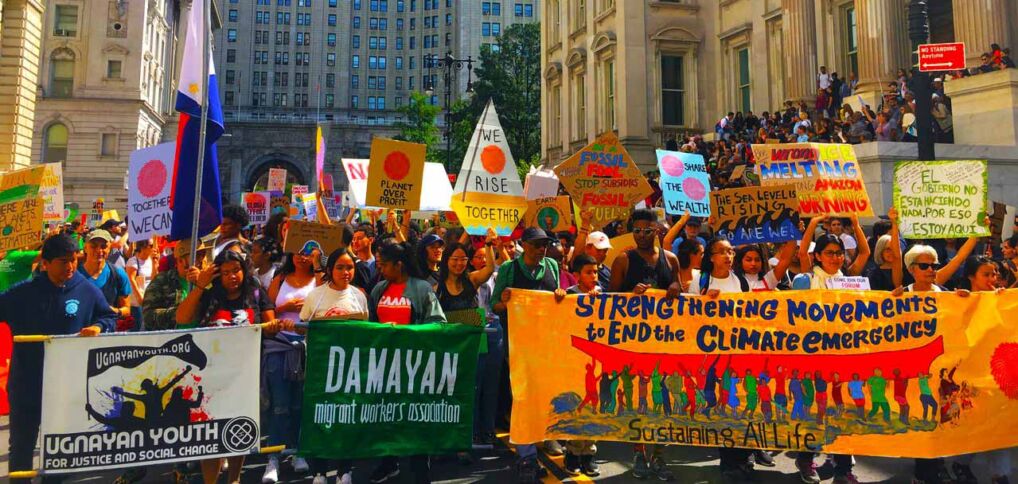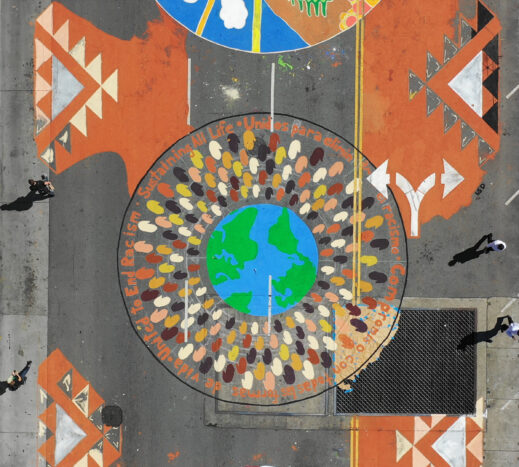
View this resource
as a PDF>>>
****
View this resource
in French>>>
****
View this resource
in Spanish>>>
A Just Transition is needed to resolve the climate emergency. We join a rising global call for a coordinated phase-out of fossil fuel production and consumption, with equity at the core of our work. We can transition from global systems of production and consumption that are energy intensive and fossil fuel dependent to systems that are sustainable, resilient, publicly-owned, and regenerative.
The workers and the communities that are dependent on or directly harmed by the fossil fuel industry are central to and must benefit from a Just Transition. Economic, health, safety, labor, and environmental policies must be guided by Indigenous and Global Majority people* poor people, workers, those in frontline communities, and vulnerable people (people with disabilities, elderly, and very young). A Just Transition will eliminate fossil fuel policies that have made some communities “sacrifice zones.”
Native and Indigenous people and Global Majority people, poor people, workers, labor and social justice leaders, and climate justice activists share common goals and face common obstacles. Divisions abound and can be difficult to overcome. The divisions of classism, racism, sexism, anti-Semitism, and other oppression distract us from our inherent connection and power. It is in everyone’s interest to come together to address the climate emergency. A key part of doing this is addressing the destructiveness of the class society.
A Just Transition must organize and form alliances to create systemic change for a regenerative future. We must broaden and strengthen our relationships with people and groups in every sector of society. Our work must be led by Native and Indigenous people and Global Majority people, poor people, and labor, environmental justice, and youth organizations.
We can create and protect jobs that meet human needs and restore damaged ecosystems. We can create long-term, career-enabling jobs with good wages, benefits that allow healthy, enjoyable lives, and high safety standards. We need strong unions for workers in the energy sector and related fields and for workers in frontline communities. We need jobs for populations previously excluded: Native and Indigenous people and Global Majority people, and for people with disabilities, poor, and young people.

A Just Transition encourages, trains, and supports people to do this work. We can create and fund the systems that ensure that people’s essential needs are met so everyone can lead dignified lives, no matter what work they do or even when they are unable to work.
A Just Transition will invest in the communities that are located next to extractive and polluting industries as well as in other communities that are vulnerable to the impacts of climate change, underemployment, and unemployment.
A Just Transition must be global. It must be funded by wealthy nations to address the the global imbalance of resource resulting from colonialism, imperialism, genocide, and oppression. We can fund the work by:
- substantially increasing taxes on corporations and the wealthy,
- redirecting money from the militaries,
- eliminating tax dodges,
- promoting stimulus spending by governments,
- eliminating the structural debt of the global South.
United we can win a Just Transition!
¡Sí, se puede!
- *The peoples of Africa, Asia, the Pacific Islands, the Caribbean, and Latin America, and those descended from them, and Indigenous people, are over eighty percent of the global population. These people also occupy most of the global land mass.
Using the term “Global Majority and Indigenous (GMI)” for these people acknowledges their majority status in the world and interrupts how the dominant (U.S. and European) culture assigns them a minority status.
Many Global Majority and Indigenous people living in dominant-culture countries have been assimilated into the dominant culture—by force, in order to survive, in seeking a better life for themselves and their families, or in pursuing the economic, political, or other inclusion of their communities. Calling these people “Global Majority and Indigenous” contradicts the assimilation.


